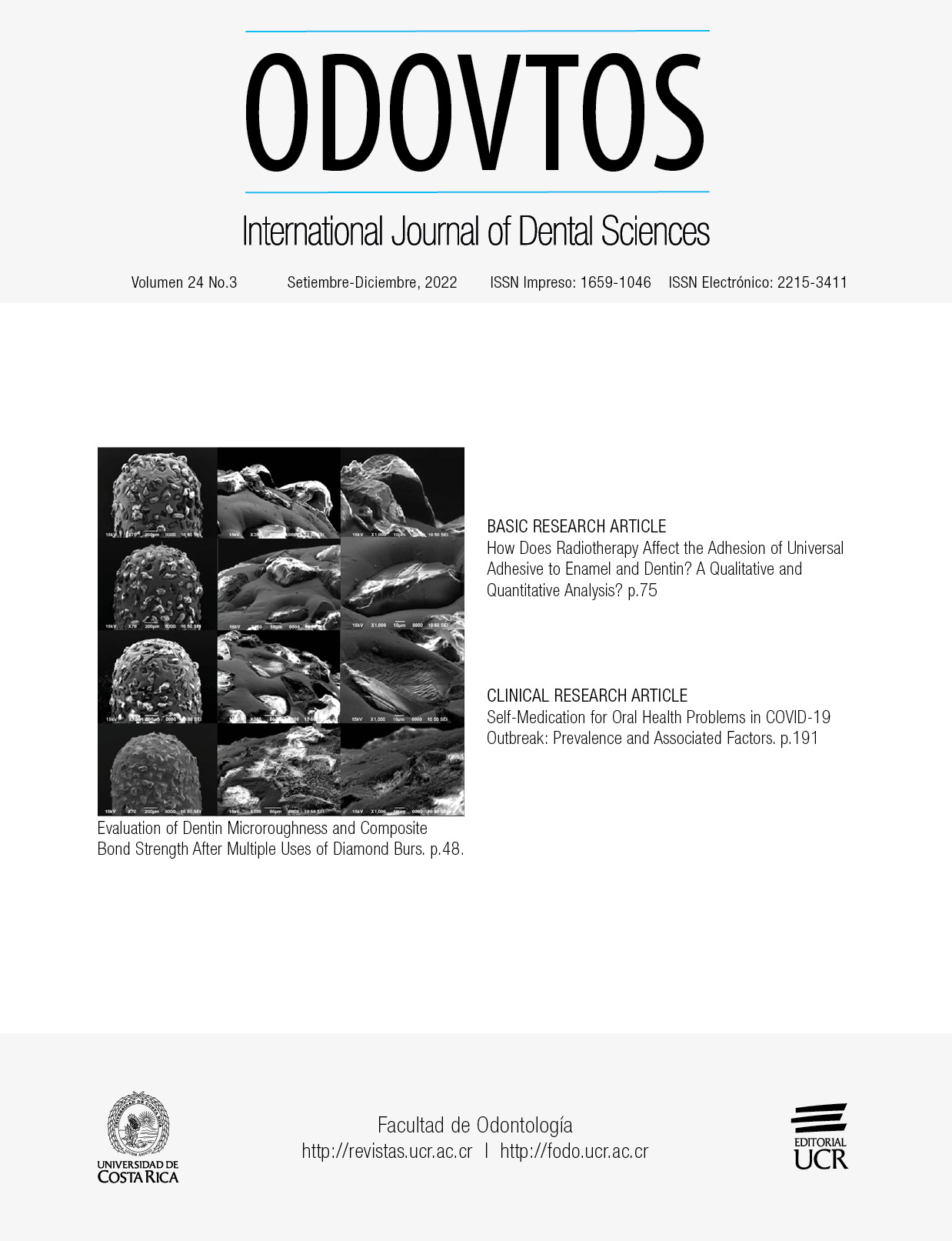Resumen
Los protocolos de bioseguridad son muy importante en la consulta odontológica. El objetivo de esta investigación fue conocer el nivel de satisfacción de los pacientes respecto a los protocolos de bioseguridad utilizados en la Facultad de Odontología para evitar los contagios por COVID-19 durante la atención dental. Se envió una encuesta por medio del correo electrónico a todos los pacientes que recibieron consulta dental en la Facultad de Odontología entre abril y setiembre del 2021. Se les consultó sobre variables sociodemográficas (sexo, rango de edad, nivel educativo aprobado y lugar de procedencia), así como si consideraban seguros los protocolos empleados durante la consulta dental para evitar los contagios por COVID-19. Se realizó estadística descriptiva estableciendo la frecuencia absoluta y relativa de las variables sociodemográficas y la satisfacción de los pacientes con los protocolos empleados en la Facultad. Se utilizó la prueba de chi cuadrado para determinar si existía diferencia en la satisfacción de los pacientes respecto a los protocolos de bioseguridad para evitar los contagios por COVID-19 durante la atención dental y las variables sociodemográficos. El 95.9% de los encuestados consideró seguros los protocolos de bioseguridad empleados y no hubo diferencia estadísticamente significativa entre la satisfacción de los pacientes con los protocolos y las variables sociodemográficas. Una gran mayoría de los pacientes que acuden a la Facultad de Odontología UCR están satisfechos con los protocolos de bioseguridad empleados para evitar los contagios por COVID-19 durante la atención dental.
Citas
Meng L., Hua F., Bian Z. Coronavirus Disease 2019 (COVID-19): Emerging and Future Challenges for Dental and Oral Medicine. J Dent Res. 2020; 99 (5): 481-7.
Li Q., Guan X., Wu P., Wang X., Zhou L., Tong Y., et al. Early Transmission Dynamics in Wuhan, China, of Novel Coronavirus–Infected Pneumonia. N Engl J Med. 2020; 382 (13): 1199-207.
Organización Panamericana de la salud. La OMS caracteriza a COVID-19 como una pandemia [Internet]. 2020. Available from: https://www.paho.org/es/noticias/11-3-2020-oms-caracteriza-covid-19-como-pandemia
Presidencia de la República de Costa Rica. Decreto Ejecutivo 42227-MP-S. Declaratoria de Emergencia Nacional [Internet]. 2020. p. pp 1-6. Available from: https://www.ministeriodesalud.go.cr/sobre_ministerio/prensa/decretos_cvd/decreto_ejecutivo_42227_mp_s_declaratoria_emergencia_nacional.pdf
Oneal, K. Universidad de Costa Rica. El Centro de Coordinación Institucional de Operaciones (CCIO) coordina la atención de la alerta amarilla por COVID-19 en la UCR [Internet]. 2020. Available from: https://www.ucr.ac.cr/noticias/2020/03/09/el-centro-de-coordinacion-institucional-de-operaciones-ccio-coordina-la-atencion-de-la-alerta-amarilla-por-covid-19-en-la-ucr.html
Facultad de Odontologia UCR. Protocolo reactivación y continuidad de las actividades de la Facultad de Odontología ante el estado de emergencia nacional por COVID-19. Facultad de Odontología. 2020. Código 010503. 2020; 1-35.
Ge Z., Yang L., Xia J., Fu X., Zhang Y. Possible aerosol transision of COVID-19 and special precautions in desntistry. J Zhejaing Univ B. 2020; 21 (5): 361-8.
Peng X., Xu X., Li Y., Cheng L., Zhou X., Ren B. Transmission routes of 2019-nCoV and controls in dental practice. Int J Oral Sci. 2020; 12 (1): 1-6.
Rodríguez Aguilar R. Odontología: rol en la transmisión del SARS-CoV-2 a través de bioaerosoles. Odovtos - Int J Dent Sci. 2020; 3 (22): 103-12.
Sigua-Rodríguez E.A., Bernal-Pérez J.L., Lanata-Flores A.G., Sánchez-Romero C, Rodríguez-Chessa J., Haidar Z.S., et al. COVID-19 y la Odontología: una Revisión de las Recomendaciones y Perspectivas para Latinoamérica. Int J Odontostomatol. 2020;14 (3): 299-309.
Sihuay-Torres M.X., Meza-Vasquez G.L., Sihuay-Torres K. Recomendaciones para el retorno a las actividades clínicas de estudiantes de Odontología durante pandemia por COVID-19. Odontol Sanmarquina. 2021; 24 (2): 83-4.
Yañez Herrera M., Salazar Rodríguez F., Frisancho Camero M. Vista de El impacto económico de la COVID 19 en la calidad del servicio odontológico. Rev Salud Andin [Internet]. 2021; 1 (3): 53-69.
Facultad de Odontología UCR. Protocolo Control de Infecciones de la Facultad de Odontología. 2019; 1-25.
Marui V.C., Souto M.L.S., Rovai E.S., Romito G.A., Chambrone L., Pannuti C.M. Efficacy of preprocedural mouthrinses in the reduction of microorganisms in aerosol: A systematic review. J Am Dent Assoc. 2019; 150 (12): 1015-1026.e1.
Guo H., Zhou Y., Liu X., Tan J. The impact of the COVID-19 epidemic on the utilization of emergency dental services. J Dent Sci. 2020; 15 (4): 564-7.
Ortiz M., Ferreras N., Hernpandez D. Ansiedad, depresión y miedo al contagio por COVID-19 en la República Dominicana (Lic.Tesis). Universidad Iberoamericana (UNIBE); 2020 [cited 2021 Nov 10]. Available from https://repositorio.unibe.edu.do/jspui/handle/123456789/518
Quezada V.E. Miedo y psicopatología la amenaza que oculta el Covid-19. Cuad Neuropsicol J Neuropsychol. 2020; 14 (1): 19-23.
Cruz Díaz M., Román García S., Pavón Rabasco F. Del uso de las tecnologías de la comunicación a las destrezas en competencia mediática en las personas mayores. Redes.com. 2015; (12): 86-111.
Huaylla K., Chino P. Conocimientos y actitudes de farmacovigilancia y satisfacción de los usuarios atendidos en farmacias durante el contexto por COVID-19 en la ciudad de Arequipa, noviembre 2020 (Lic. tesis). Universidad María Auxiliadora; 2021 [cited 2021 Nov 10]. Available from https://repositorio.uma.edu.pe/handle/20.500.12970/505
Nuñez E. Nivel de satisfacción de los usuarios en el proceso de atención ante el COVID-19 en el centro de Salud Martínez (Lic. tesis). Universidad Técnica de Ambato; 2021 [cited 2021 Nov 10]. Available forma: http://repositorio.uta.edu.ec/handle/123456789/32585
Ramaswamy A., Yu M., Drangsholt S., Ng E., Culligan P.J., Schlegel P.N., et al. Patient Satisfaction With Telemedicine During the COVID-19 Pandemic: Retrospective Cohort Study. J Med Internet Res. 2020; 9.
Villa A., Sankar V., Shazib M.A., Ramos D., Veluppillai P., Wu A., et al. Patient and providers’ satisfaction with tele(oral)medicine during the COVID-19 pandemic. Oral Dis. 2020: 1-4.


